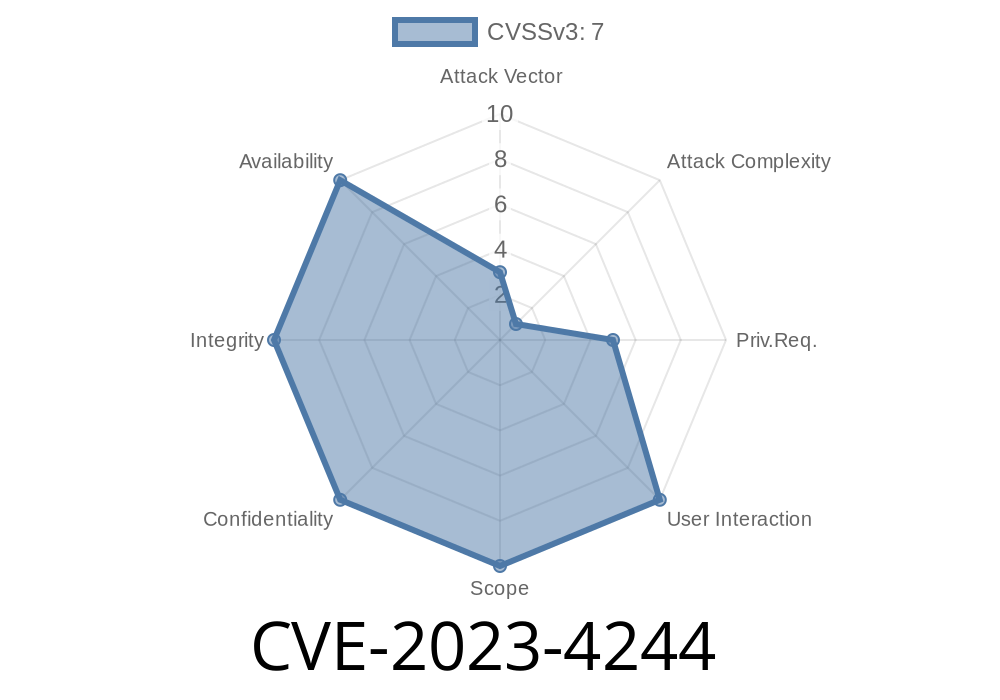In 2023, security researchers discovered a critical vulnerability in the Linux kernel's netfilter nf_tables component, which is tracked as CVE-2023-4244. This bug makes it possible for a local attacker to gain root (administrator) privileges on affected Linux systems.
In this post, we break down how this vulnerability works in simple terms, provide real code snippets showing how exploitation is possible, and offer reliable resources for mitigation and further reading.
What Is CVE-2023-4244?
CVE-2023-4244 is a "use-after-free" vulnerability, triggered by a race condition inside the nf_tables part of Linux's netfilter firewall. Specifically, it occurs during processing of netlink messages related to nft_set elements. If the reference counter of a set element is improperly managed during simultaneous transactions, the kernel may end up accessing (or "using") memory that has already been "freed," opening the door for attackers to hijack process flow.
Because the Linux kernel runs with the highest privilege, such a bug can lead to Local Privilege Escalation (LPE): a regular user application can break out of its restrictions and take over the system with root rights.
If you run Linux and use nftables/netfilter, you are likely affected unless you've patched your kernel after September 2023.
Here's a simple diagram of what's going on
1. Linux uses a set data structure (nft_set) in its firewall/netfilter code.
The object is then prematurely freed, but still in use.
6. An attacker fills the freed memory with user-controlled data, causing the kernel to execute arbitrary code.
The bug exists in code like this (simplified for clarity)
// kernel/net/netfilter/nf_tables_api.c
struct nft_set_elem {
struct nft_set_ext ext;
...
};
static void nft_set_elem_destroy(struct nft_set *set, struct nft_set_elem *elem)
{
/* Use-after-free if refcount underflows! */
nft_set_ext_destroy(set, &elem->ext);
kfree(elem);
}
Reference counters are decremented during two separate kernel operations, sometimes at exactly the wrong moment. All it takes is careful timing by the attacker.
The Attack
1. Prepare Race Condition: The attacker adds and flushes set elements via netlink socket requests in multiple threads.
2. Trigger Use-After-Free: The GC thread and netlink transaction overlap; a set element is freed while still in use.
3. Heap Spray: The attacker fills system memory with user data—often using fork() or mmap()—to get their data into the freed memory location.
4. Kernel Code Execution: When the kernel later accesses the dangling pointer, it operates on malicious data, leading to possible code execution.
Here's a simplified proof-of-concept (POC) showing the basic exploit mechanics (does not elevate privileges, but triggers UAF):
# WARNING: DO NOT RUN ON PRODUCTION SYSTEMS!
import threading
import time
import socket
import struct
def add_elem():
# Sending netlink add message to kernel (pseudo-code)
s = socket.socket(socket.AF_NETLINK, socket.SOCK_RAW, socket.NETLINK_NETFILTER)
while True:
s.send(b"ADD SET ELEMENT payload")
def flush_set():
# Sending netlink flush message to kernel (pseudo-code)
s = socket.socket(socket.AF_NETLINK, socket.SOCK_RAW, socket.NETLINK_NETFILTER)
while True:
s.send(b"FLUSH SET payload")
a = threading.Thread(target=add_elem)
f = threading.Thread(target=flush_set)
a.start()
f.start()
# Main thread sprays heap
while True:
# Fill system memory - real exploits would be more advanced
bytearray(1024*1024)
A real exploit would use more precise netlink payloads and spray raw kernel objects, but this illustrates the race.
Patch immediately!
The vulnerability was fixed in commit 3e91bebd994635df2346353322ac51ce84ce6d8 in the Linux source tree (September 2023).
Check your distro's advisories: Many distributions released updates in late 2023.
- Debian Security Tracker
- Red Hat Security Advisory
- Ubuntu CVE tracker
- If you can’t patch, restrict untrusted users from running arbitrary code or loading nftables rules.
Additional References
- Main CVE database entry
- Official Kernel Patch
- Original bug report and mailing list discussion
- Exploit-DB entry (when/if available)
- netfilter security docs
Final Thoughts
CVE-2023-4244 is yet another reminder that kernel bugs are extremely dangerous, as they can compromise the entire security of your system. Keeping your Linux kernel updated is critical, especially for servers and systems exposed to arbitrary users or workloads.
If you administer a Linux system used by others, you should patch this bug immediately or risk someone getting root without your knowledge.
### Got questions or want to dive deeper? Head to the Linux Kernel Mailing List or the netfilter user forum.
Timeline
Published on: 09/06/2023 14:15:11 UTC
Last modified on: 10/29/2023 02:43:23 UTC
